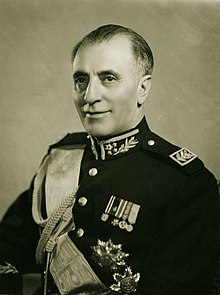Fazlollah Zahedi
Fazlollah Zahedi ( Persian فضلالله زاهدی; * 1897 in Hamadan ; † September 1 or 2, 1963 in Geneva ) was a general , politician and Prime Minister of Iran .
Life
Zahedi joined the Persian Cossack Brigade in 1916 . After a few months of military training in Tehran, he was classified as a lieutenant and served under Reza Khan, the later Reza Shah Pahlavi, initially in Gilan in the fight against the Jangali movement, led by Mirza Kutschak Khan and Iranian Bolsheviks, who had proclaimed an Iranian Soviet Republic . In 1921 he was seriously wounded during the fighting in Azerbaijan . In 1922 he was promoted to major general. A year later, in June 1922, he played a leading role in suppressing a Kurdish uprising led by Ismail Simko , who wanted to establish a Kurdish republic. He then received the highest military award in Iran, the Zolfaghar Order . In 1923 he was given the command of the Fars Brigade. In 1926 he was transferred to Rasht and commanded the brigade there. In 1929 Zahedi was arrested and sentenced to one year in prison for negligence on the job. After his release from prison, he received the post of police chief of Tehran on probation in 1931. Since it could be proven that he was complicit in the successful escape of several prisoners, he was finally released from military service in 1931, later pardoned and reinstated with the rank of general.
In 1941, shortly before Reza Shah resigned, Zahedi was discharged from the army for indiscipline. Due to his pro-German attitude, he was taken prisoner after the Anglo-Soviet invasion of Iran in 1943 and was interned by the British in a prison camp in Palestine. After the end of the Second World War, Zahedi was released in 1945. In 1949 he again became police chief of Tehran. Politically, he supported the National Front .
Under the first Mohammad Mossadegh government , Zahedi became Minister of the Interior, but, as Gérard de Villiers writes, a break occurred due to Mossadegh's attempts to reach an understanding with the Tudeh party of Iran , since Zahedi, who owned large estates, was considered a strict anti-communist. After his break with Mossadegh, Zahedi became a member of the “Committee for the Salvation of the Fatherland” (Komitah-e Najat-e Vatan) , a resistance movement among Iranian officers and civilians.
1953 coup
Mohammad Reza Shah Pahlavi instructed the Mossadegh opponent Zahedi to take over his post as prime minister. The decree of August 13, 1953 was supposed to be the starting point for Operation Ajax and was worded as follows:
- "Given the situation our country finds itself in, we need a knowledgeable and experienced man to take the reins of government into his hands, and knowing your skills and merits, I will appoint you Prime Minister and entrust you with the task of through your serious efforts to improve the situation of the country, to resolve the current crisis and to raise the standard of living of the people. "
resignation
In April 1955, Zahedi asked the Shah to resign with the words
- "The responsibility of my office has become too great to be borne any longer."
Zahedi was then sent to the Persian representative of the UN in Geneva, where he also died. Suspicions according to which Zahedi could have had "conspiratorial intentions" and therefore the Shah indirectly let Zahedi inform him that he had to resign, de Villiers describes with increased activities by Zahedi, which the suspicious Shah no longer wanted to see after the fall of Mossadegh.
Honors
- 1956: Grand Cross of the Order of Merit of the Federal Republic of Germany
Individual evidence
- ↑ Stephanie Cronin: The Army and the Creation of the Pahlavi State in Iran 1910–1926. Tauris Academic Studies. London 1997, pp. 244f.
- ^ Stephanie Cronin: The Army and the Creation of the Pahlavi State in Iran. Tauris Academic Studies. London 1997, p. 245.
- ↑ de Villiers, p. 302
- ↑ de Villiers, page 331
literature
- Stephanie Cronin: The Army and the Creation of the Pahlavi State in Iran. 1910-1926 . Tauris Academic Studies, London a. a. London 1997, ISBN 1-86064-105-9 ( Library of modern Middle East studies 12).
- Gérard de Villiers : The Shah. The power and glory of the emperor on the peacock throne . Heyne, Munich 1976, ISBN 3-453-00632-1 ( Heyne books no. 5268).
| personal data | |
|---|---|
| SURNAME | Zahedi, Fazlollah |
| ALTERNATIVE NAMES | فضلالله زاهدی (Persian) |
| BRIEF DESCRIPTION | Iranian general, politician and Prime Minister of Iran |
| DATE OF BIRTH | 1897 |
| PLACE OF BIRTH | Hamadan |
| DATE OF DEATH | September 1, 1963 or September 2, 1963 |
| Place of death | Geneva |

